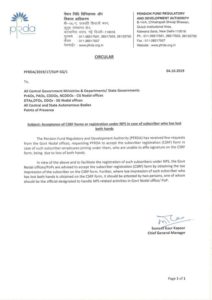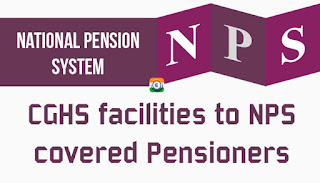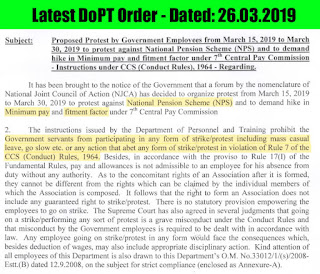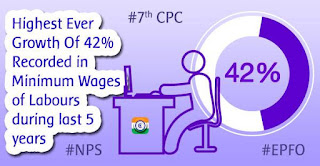NPS to OPS: New Pension Scheme Demand To Scrap it
New Pension Scheme Demand To Scrap it
NEW PENSION SCHEME (NPS):
The New Pension Scheme is made compulsory for Government employees was
brought into effect 2004, this has effected them a lot, lot of
agitations are being carried out on scrapping the New Pension Scheme,
this agitations has forced many State Governments such as Karnataka,
Kerala, Andhra Pradesh, Delhi State Governments to reconsider this New
Pension Scheme and formed an expert committee to review this New Pension
Scheme. This New Pension Scheme was not implemented by West Bengal
State Government. In this angle an analysis is made all about New
Pension Scheme and ways to scarp or modify the New Pension Scheme to
benefit the Government employees at large is suggested.
Need for Pension
: The Pension System thus started in India was finalized by the Indian
Pension Act of 1871. It appears that the British Government had the
conception of providing its pensioners increase in their pensions to
neutralize the effect of inflation.
Pension is a reward for past
service. It is undoubtedly a condition of service but not an incentive
to attract new entrants, the Pension is paid for past satisfactory
service rendered, and to avoid destitution in old age as well as a
social welfare or socio-economic justice measure, the fact that the cost
of living has shot up and correspondingly the possibility of savings
has gone down and consequently the drop in wages on retirement.
That
pension is neither a bounty nor a matter of grace depending upon the
sweet will of the employer and that it creates a vested right subject to
1972 rules which are statutory in character because they are enacted in
exercise of powers conferred by the proviso to Art. 309 and clause (5)
of Art. 148 of the Constitution; (ii) that the pension is not an
ex-gratia payment but it is a payment for the past service rendered; and
(iii) it is a social welfare measure rendering socio-economic justice
to those who in the hey-day of their life ceaselessly toiled for the
employer on an assurance that in their old age they would not be left in
lurch.
As on 01-01-2018 there were 51.96 lakh pensioners in the
country, including from Central Civil Services, Railways, and Post,
Defence and Defence civilians.
EVOLUTION OF NEW PENSION SCHEME (NPS) IN INDIA:
In
1991 Government of India as introduced diverse economic reforms to pull
the country out of economic crisis and to accelerate the rate of
growth. These reforms are often described as the New economic policy
(NEP) or policy of LPG where L for liberalisation; P for privatisation; G
for globalisation. The Congress Government under the Prime Ministership
of Hon’ble Prime Minister Shri P. V. Narasimha Rao, the signed an
agreement with the International Monetary Fund (IMF) to get the IMF loan
in which the IMF had imposed various conditions to get the soft loan
which includes pension reforms , which the Indian Government Congress
Government had accepted it to reform in a 10 years period .
On the
basis of the decision taken in the Eleventh Conference of State Finance
Secretaries held in the Reserve Bank of India (RBI) during January
2003, a Group was constituted by the RBI in February 2003 to study the
pension liabilities of the State Governments and make suitable
recommendations.
The "
Pension Fund" to be created
under the proposed revised schemes should be kept completely outside
the States' Consolidated Fund and the Public Account
The pension
systems, both for Civil Servants and other citizens, as evolved over the
years have begun to show signs of financial stress in many countries,
including India. Since the pension benefits of Government employees are
usually paid from the general revenue of the Governments, the steep rise
in such liabilities adversely affect the fiscal soundness of the
Government entities. In India too, the increasing pension liabilities of
the Central and State Governments have emerged as a major area of
concern, especially in the wake of fiscal deterioration in recent years.
About 20% of the state Government funds are spent on pension.
During
the Hon'ble Prime Minister Shri Atal Bihari Vajpayee of NDA was in
power from 1998 to 2004 which implemented this agreement of IMF on
pension reforms . The NDA Government constituted two committees namely
B.K.Bhattacharya committee headed by Shri B.K.Bhattacharya, Former Chief
Secretary, Government of Karnataka as chairman and under the
Chairmanship of Shri Biju Patnaik, Chief Minister of Orissa , both these
committees recommended introduction of New Pension Scheme (NPS) &
Hon'ble Prime Minister Shri Manmohan Singh of Congress (UPA) was in
power from 2004 to 2014 continued to accept these pension reforms.
The New Pension Scheme (NPS) was announced on December 22, 2003 by the
NDA Government, for all new government employees excepting those in the
Armed Forces. This brand new system replaces the defined benefit system
of pension and this includes GPF. Contributory pension scheme is for
entrants who joined after 1st January 2004.
While the NPS is
mandatory for the Central government employees, it has potentially a
much wider reach. As of March 2007, 19 states which have decided to
introduce similar schemes, mandating newly recruited civil servants to
mandatorily join the NPS‐type scheme.
The NPS started with the
decision of the Government of India to stop defined benefit pensions for
all its employees who joined after 1 January 2004. While the scheme was
initially designed for government employees only, it was opened up for
all citizens of India in 2009. Over 15 lakhs Government employees are
currently registered in NPS scheme.
The Department of Economic
Affairs (DEA) at the Ministry of Finance, notified a new pensions
regulator in August 2003, before the NPS commenced operations in January
2004. The PFRDA bill was presented in 2005, and was finally passed in
Parliament in 2013.
Let us analyse why Government is adopting the pension reforms:
| Sl. no | Indian Government View | Employees view |
|---|
| 1 | The
ratio of retirees to workers is on continuous rise and further by 2030
the 25% of the population (200 million pensioners) will be above 60
years of age. | The large number of employees are effected by the
New Pension reforms, hence Government should keep it in mind the
interest of the large chunk of employees |
| 2 | The
Pension system shall put enormous financial pressure on the Government
and take away funds meant for social cause spending, this will cause a
drain on the state of economy. | About 80 % of employees are Group
"C" workers, the pension amount is ultimately spent by them for their
daily needs and money flows into the market and economy will not be
effected , secondly Government is a model employer and it has social
responsibility towards its employees. |
After a
decade of existence, there is need to examine the existing NPS and
compare the performance of this system to the goals with which it was
created.
*One of the key bottlenecks has been the lack of a sound
regulatory framework, put in place by an empowered and independent
regulator. The PFRDA Bill that had been pending since 2002 was finally
passed in 2013. This enables the formal institutionalisation of the
PFRDA as the regulator of the NPS. The PFRDA can now take on the task of
both the relatively short term agenda of closing the gap between the
current NPS and the original design.
*Central government employees
can invest in these assets only through their Tier II account which get
higher returns on longer period.
- After the enactment of the
Pension Fund Regulatory and Development Act, 2013, it is not the
exclusive liability of the government to pay the pension."
The
Ministry of Finance will oversee and supervise the Pension Funds through
a new and independent Pension Fund Regulatory and Development
Authority.”
WHAT IS THE NATIONAL PENSION SCHEME?
Each
Government employee contributes 10 % of his salary (Basic Pay + DA +
DP) to the pension account , which is then matched by a Government
contribution of an equal amount .
National Pension Scheme or New
Pension scheme is a pension plan offered by the government. Investment
in this scheme is via debt and equity market. The invested amount is
locked until retirement. At retirement age, you can withdraw 60% of the
maturity amount while the balance40% must be invested in annuity. The
maturity amount is taxable. The NPS is regulated by the PFRDA and fund
management is by designated fund managers from the private and public
sector. NPS has the lowest charges.
From our salaries and daily
allowance, 10 per cent is cut towards pension and an equal amount is
given by the government. This amount is invested into the share markets
under the new scheme.
An NPS subscriber can withdraw 25% of his
contribution to the corpus for emergencies before retirement. Instead of
withdrawing the entire amount at retirement, you can withdraw Rs
25,000, or 25% of your contribution, earlier, without any tax incidence.
The remaining Rs 1.75 lakh is withdrawn on retirement.
New
Pension Scheme extension of benefits of Retirement Gratuity and Death
Gratuity to the Central Government employees covered by New Defined
Contribution Pension System (National Pension System)-regarding. All
these condition would be equally applicable for grant of gratuity to
employees covered under New Pension Scheme.
An individual can
claim tax deduction of upto 10 percent of the salary contributed towards
NPS under Section 80 C. For those contributing through the corporate
scheme, an employee can claim tax deduction on contribution made by the
employer, not exceeding 10 percent of his basic salary plus dearness
allowance (if any) Under Section 80 CCD (2). This is above the overall
limit of Rs.1 lakh offered under Section 80C.
How New Pension Scheme (NPS) is affecting the Government employees.
The
New Pension Scheme is highly disadvantageous to the Government
employees under the present situation the pension amount is invested
into the share markets under the new scheme. If the markets are doing
well, the employees will get a good pension if the share market fails no
pension is available to them. Under the old system, employees would get
a fixed amount as pension that was 50 per cent of their last basic
salary. When the salary was hiked, the pension amount too would be
revised. Under the present NPS system, there is no security as pensions
depend on market conditions. Secondly the NPS is highly disadvantageous
if the length of the Government service is less if a employee serves for
20 years, he draws a pension of about Rs 3,000/- to Rs 5,000/ only. If
he completes 33 years of service he draws about Rs 12,000/- to Rs
15,000/- compared to Rs 15,000/- to Rs 20,000/- in the old pension
system, this new pension system needs a deep study and its minimum
pension should be at least 50% of the last pay drawn. It is upto the
Government how and where the money is invested, but a minimum guarantee
of 50% of the last pay drawn should be assured by the Government to the
employee.
Under New Pension Scheme is in reality much steeper than
what the quantum of pension would indicate the differential treatment
for those retiring under Old Pension scheme and New Pension Scheme,
would be according differential treatment to pensioners who form a class
irrespective of the type of retirement and, therefore, would be violate
of Art. 14. It was also contended that classification based on
fortuitous circumstance of retirement in old or New Pension Scheme,
fixing of which is not shown to be related to any rational principle,
would be equally violate of Art. 14.
Pension Scheme around the Globe
: The USA, Canada, United Kingdom, China , Germany etc. Governments
have a scheme of a Defined Benefit (DB) pension is where you receive a
specific amount of pay out that is guaranteed by employer, regardless of
how their pension investment performs. Your defined benefit amount
depends on how much is paid into the plan and your years of service with
that employer.
CONCLUSION:The Indian Government
should also have a similar Defined Benefit (DB) pension scheme like
other major countries in the world have, as many state Governments are
re thinking on the New Pension Scheme, hence this New Pension Scheme
should be remodelled to suit the Government employees. The Government
should take up more social responsibilities of protecting its employees.
We
request the government to reintroduce the old pension system. For this a
greater movement should take place amongst the New Pension Scheme
employees forcing Central Government to rethink the new pension policy
adopted after 2004.
P.S.Prasad
Working President
COC Karnataka
Source: http://karnatakacoc.blogspot.com/











